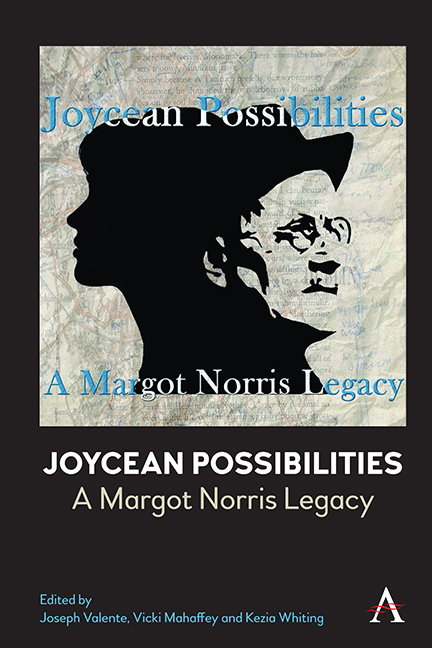16 - The Reel Margot
Published online by Cambridge University Press: 20 April 2024
Summary
Why do some critical works on film not receive their proper acknowledgement until years after their publication? Many essays have appeared on Joyce and film, and quite a few books on the subject. But what does “Joyce and film” mean here? It could mean James Joyce and film adaptations, the use of Joycean techniques in the history of film, the ways films influence our reading of Joyce, Joyce's own attempts to launch a movie house, Joyce's associations with early cinematic giants, the filmic qualities of Joyce's writing, allusions to films and film stars in Joyce, or the medium of film and the (moving) art of Joyce. It could also mean applying a specific film (or critical) theory to the works of Joyce, or perhaps a digital archive devoted to updating references pertaining to film and Joyce. It could even be a title of a course: Joyce and film. None of these meanings captures the uniqueness of Margot Norris’ book Ulysses, a work that surpasses each of the individual meanings listed. Yet, other than scattered references to her short book in later books on the topic(s), there needs to be what I will call an inheritance of Norris on Ulysses/film.
The opening dedication to Norris’ gem of a book suggests the kind of autobiographical and self-reflective (philosophical) musings and recollections of Stanley Cavell: “For my son, Josef Norris, whose love of films and filmmaking when he was young inspired me” (v). This non-saccharine dedication addresses an other's love, a clear distinction between films and filmmaking, the memory of youth, and personal inspiration. In her “Acknowledgements” (a Cavellian term in other discourses), Norris once again invokes her memory of her own youth and inspiration: “I first saw the 1967 Joseph Strick film of James Joyce's Ulysses while I was an undergraduate at the University of Florida, and before I had yet read the novel. The film inspired me to read the book, and set me on my way to becoming a life-long scholar of the works of Joyce” (ix ): Strick's Ulysses prior to Joyce's Ulysses, prior to Norris’ Ulysses.
The personal intensifies when Norris tells us that she was “in touch with Joseph Strick […] [which] allowed me to ask hundreds of questions by e-mail, to which I received full, interesting, often funny replies” (ix).
- Type
- Chapter
- Information
- Joycean PossibilitiesA Margot Norris Legacy, pp. 241 - 250Publisher: Anthem PressPrint publication year: 2022

